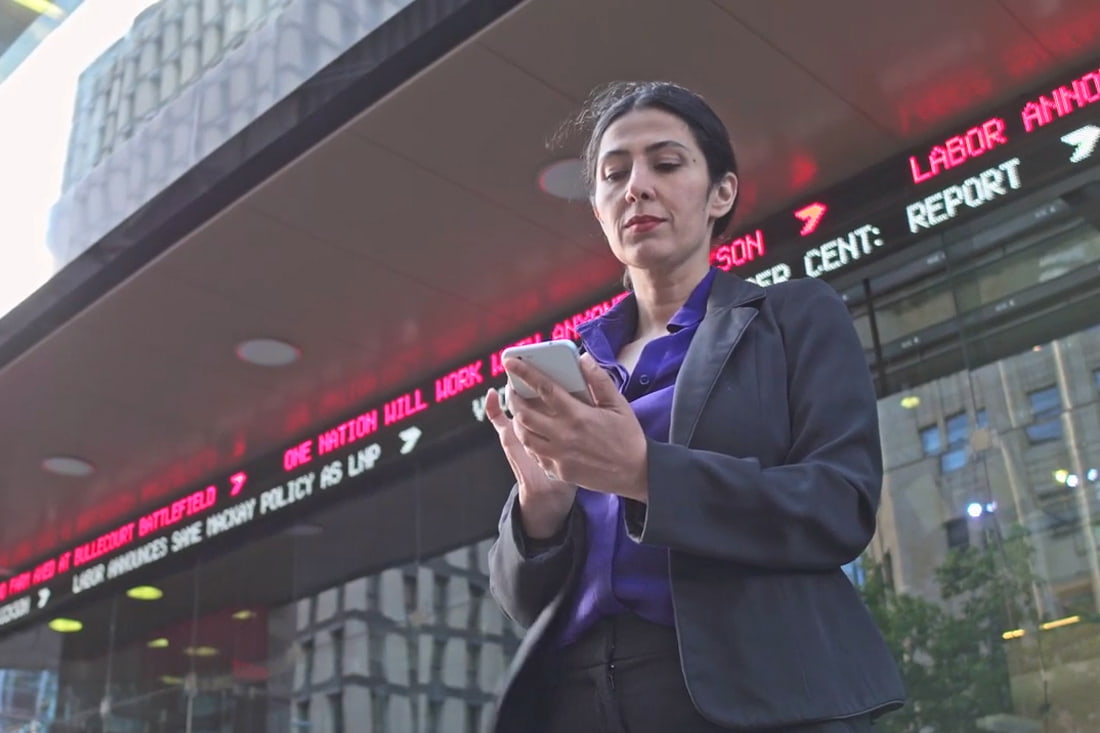Learn about the effects of social media bots
Through the Graduate Certificate in Digital Communication, learn a variety of current topics such as the pros and cons and their wider implications. Professor Daniel Angus explains.
Learn through meaningful research
Dr Timothy Graham describes how the effects of bots are known to infiltrate society. Learn about their tell-tale signs, how they work and more through the Graduate Certificate in Digital Communication.
Learn about the effects of social media bots
Through the Graduate Certificate in Digital Communication, learn a variety of current topics such as the pros and cons and their wider implications. Professor Daniel Angus explains.
Learn through meaningful research
Dr Timothy Graham describes how the effects of bots are known to infiltrate society. Learn about their tell-tale signs, how they work and more through the Graduate Certificate in Digital Communication.




Highlights
- The QUT School of Communication is ranked as Australia’s leading school for communication and media studies, and among the top schools in the world. QUT Media and Communication is ranked 1st in Australia and top 20 in the world in the 2023 QS World University rankings.
- Analyse and create data-driven compelling stories via social media platforms.
- Develop an understanding of digital culture and the development of social media platforms.
- Work with tools for data visualisation and analysis, including introduction to programming.
- Use cross-cultural communication skills to solve problems as a team in disruptive and volatile media environments.
Highlights
- The QUT School of Communication is ranked as Australia’s leading school for communication and media studies, and among the top schools in the world. QUT Media and Communication is ranked 1st in Australia and top 20 in the world in the 2023 QS World University rankings.
- Analyse and create data-driven compelling stories via social media platforms.
- Develop an understanding of digital culture and the development of social media platforms.
- Work with tools for data visualisation and analysis, including introduction to programming.
- Use cross-cultural communication skills to solve problems as a team in disruptive and volatile media environments.
Why choose this course?
Digital transformation is impacting global media and communication production, distribution and consumption at unprecedented levels. This data and automation driven disruption is increasingly delivering content across personal mobile devices, placing pressure on traditional institutions and giving rise to new and emerging forms of content production and distribution.
Real-world learning
The course is organised with an emphasis on authentic real-world learning that prepares you to creatively and effectively address a range of challenging communication scenarios. You will benefit from a direct alignment with world-leading digital media research from the QUT Digital Media Research Centre.
Real-world learning will also be embedded in the course through opportunities of optional work placement.
Learn from the best
The Digital Media Research Centre and the QUT School of Communication are consistently ranked as one of Australia’s leading schools in the field of communication and media studies, and among the top schools in the world in this field. QUT Media and Communication is ranked 1st in Australia and top 20 in the world in the 2023 QS World University rankings. QUT is also the only university in Australia that has received the top ranking for communication and media studies in every Excellence in Research Australia (ERA) round since 2010.
Explore this course
Today’s communication professional needs to have the skills and knowledge to operate in this new and disruptive digital media environment. This course will provide you with the critical thinking skills needed to design and implement solutions to the key communication challenges that confront today's society.
This course is a six-month full-time (or part-time equivalent) program that takes your career to the next level by providing you with skills and knowledge across areas such as social media storytelling, analytics and data visualisation.
This program is designed to provide a broad overview of the digital communication field and foundational skills, which will be developed in further depth through the Graduate Diploma or Masters of Digital Communication courses.
You will develop skills in social media, industry disruption, data analytics, artificial intelligence, automation and visualisation to enable you to pursue opportunities in the Digital Communication field.
Careers and outcomes
Graduates from our courses have successful careers in government, industry and the community sector. This course opens up exciting and creative media and communication roles in a range of industry sectors with globally transferable skills enabling employment anywhere across the globe.
Course articulation
You will have the option of continuing your studies with a Graduate Diploma in Digital Communication or a Master of Digital Communication.
Possible careers
- Digital content producer
- Digital journalist
- Digital performance analyst
- Social media entrepreneur
- Social media manager
To meet the course requirements for the Graduate Certificate in Digital Communication, you must complete a total of 48 credit points of core units, made up of:
- 6 units, worth 6 credit points each
- 1 project unit, worth 12 credit points.
Many of the units in this course use intensive teaching periods. These intensive teaching periods are offered over shorter durations such as 5 weeks so you can focus your study on a smaller number of units. The intensive mode means that you will have increased flexibility in fitting study around your other commitments. Access more information about intensive teaching period dates (Flexible teaching periods).
To meet the course requirements for the Graduate Certificate in Digital Communication, you must complete a total of 48 credit points of core units, made up of:
- 6 units, worth 6 credit points each
- 1 project unit, worth 12 credit points.
Many of the units in this course use intensive teaching periods. These intensive teaching periods are offered over shorter durations such as 5 weeks so you can focus your study on a smaller number of units. The intensive mode means that you will have increased flexibility in fitting study around your other commitments. Access more information about intensive teaching period dates (Flexible teaching periods).
- Course code
- KC86
- CRICOS code
- 099300C
-
- Kelvin Grove
-
- Kelvin Grove
- 6 months full-time
- 12 months part-time
- 6 months full-time
- February and July
- February and July
Entry requirements
You must have one of the following:
- A recognised bachelor degree (or higher qualification) in any discipline; or
- A completed diploma (or higher qualification) in advertising, animation, communication, interaction design, journalism, media, marketing, or public relations followed by at least two years full-time (or equivalent) professional experience working in a field related to your qualification; or
- Five years full-time (or equivalent) professional experience working in advertising, animation, communication, interaction design, journalism, media, marketing, or public relations.
Minimum academic requirements
Entry requirement
You must have a completed recognised bachelor degree (or higher) in any discipline.
Minimum English language requirements
Select the country where you completed your studies to see a guide on meeting QUT’s English language requirements.
Your scores and prior qualifications in English-speaking countries are considered. Approved English-speaking countries are Australia, Canada, England, Ireland, New Zealand, Scotland, United States of America and Wales.
If your country or qualification is not listed, you can still apply for this course and we will assess your eligibility.
We accept English language proficiency scores from the following tests undertaken in a secure test centre. Tests must be taken no more than 2 years prior to the QUT course commencement.
| English Test | Overall | Listening | Reading | Writing | Speaking |
|---|---|---|---|---|---|
| IELTS Academic / One Skill Retake | 6.5 | 6 | 6 | 6 | 6 |
|
Cambridge English Score
You must share your results with QUT through the Candidate Results Online website. |
176 | 169 | 169 | 169 | 169 |
| PTE Academic | 58 | 50 | 50 | 50 | 50 |
| TOEFL iBT | 79 | 16 | 16 | 21 | 18 |
Don't have the English language score you need? We can help!
We offer English language programs to improve your English and help you gain entry to this course.
When you apply for this course, we will recommend which English course you should enrol in.
Your actual fees may vary depending on which units you choose. We review fees annually, and they may be subject to increases.
2026 fees
2026: Fee available from July
2026 fees
2026: Fee available from July
2025 fees
2025: $12,900 per year full-time (48 credit points)
2025 fees
2025: $17,900 per year full-time (48 credit points)
Student services and amenities fees
You may need to pay student services and amenities (SA) fees as part of your course costs.
FEE-HELP: loans to help you pay for your course fees
You may not have to pay anything upfront if you're eligible for a FEE-HELP loan.
You can apply for scholarships to help you with study and living costs.
International Merit Scholarship
A high achievement scholarship for future international undergraduate and postgraduate students.
- Scholarship eligibility
- Academic performance
QUT Real World International Scholarship
A scholarship to cover tuition fees, with eligibility based on your prior academic achievements.
- Scholarship eligibility
- Academic performance
Keep up to date
QUT courses for you
Like to save your courses?
Please enter your first name and email so we can save your courses for you